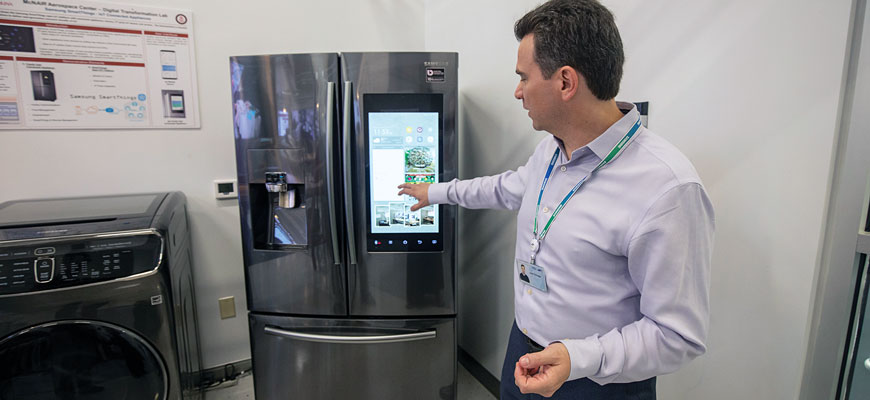
The next big thing(s)
New labs will help create Internet of Things
Posted on: December 31, 2018; Updated on: December 31, 2018
By Page Ivey, pivey@mailbox.sc.edu, 803-777-3085
Turn on the lights in your house from your smartphone. Ask your refrigerator if you’re out of OJ while you’re standing in the store. Get reminders from your car that it’s time for an oil change. Welcome to the Internet of Things.
The university has entered two new partnerships — the Industrial Internet of Things Research Lab, which is a partnership with IBM, and the 15,000-square-foot Digital Transformation Lab, which will serve as a research showplace for projects with an array of real-world industrial and consumer applications. USC Times asked Bill Kirkland, director of the USC Office of Economic Engagement, to help us understand both ventures.
We hear more and more about the Internet of Things — but what exactly is that?
The Internet of Things (IoT) is the idea that the “things” people use every day can have sensors and collect data. These things can be as simple as a watch, a cellphone or a home appliance, or as sophisticated as a car or an airplane. The idea is that all of these things can connect and share data. To make sense of it all, software applications have to be built to use the data collected and perform analytics on that data.
What specifically will the IBM research lab be working on?
They are working on visual inspection systems for manufacturing and drones, application development to use the data collected, and interface development — think, iPhone apps. They are also working on acoustic analysis to determine what makes devices fail, as well as AI and machine learning to suggest corrective actions. Robotics are another area of interest — we have Yaskawa Robotics involved as well.
Why did IBM choose USC for this project?
The university has demonstrated excellence in aerospace, and we have been at the forefront of IoT-type applications through work done by the Center for Preventative Maintenance, led by Abdel Bayoumi and his students. IBM has told us that nobody builds solutions from Powerpoints anymore — they need to see the solution in practice. We’re a perfect environment for that. Working with the lab will help companies reduce risk by testing products on real assets before they go to market. Finally, we have a large consortium of partners we can leverage. These partners are willing to work together at USC on solving industry problems.
Tell us more about the Digital Transformation Lab. Who are the other partners in the lab, and what can we expect to come out of it?
Right now, the partners are Yaskawa, Seimens and Samsung. We expect to involve a large pharmaceutical company soon to work with one of our robotics partners. We have had requests from dozens of companies to come through, and we’re working on setting those up now. I expect the number of partners to grow significantly.
What kind of opportunities are available for USC faculty and students to get involved in these new labs?
The application of all this technology is going to be fascinating. Students will be able to work on cutting-edge problems. This is important because not only does it expose them to the technology itself, it also allows them to understand real-world issues they will face in the workplace after school. Furthermore, our graduates will have a leg up on fellow job seekers due to their exposure to, and utilization of, industry-grade equipment and software as students.
For faculty — with more and more intense competition for federal research dollars — partnering with industry provides another potential funding stream for research. Faculty members are encouraged to submit proposals to our partners, collaborate with their R&D departments and share best practices with leading global companies. It’s a win-win for everyone.